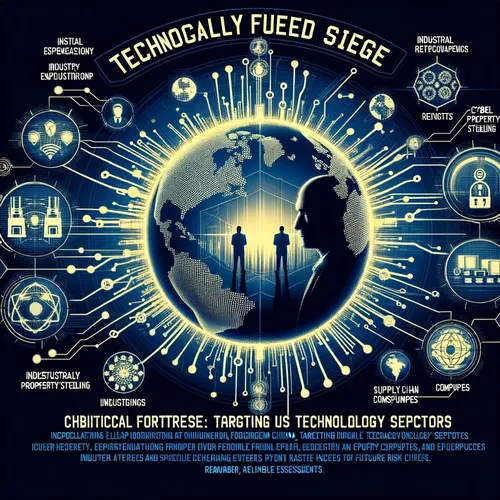Silicon Smackdown: Chinese Spy Games, TSMC Drama, and TikTok's Dirty Secret
- Author
- Quiet. Please
- Published
- Sun 10 Aug 2025
- Episode Link
- https://www.spreaker.com/episode/silicon-smackdown-chinese-spy-games-tsmc-drama-and-tiktok-s-dirty-secret--67322685
This is your Silicon Siege: China's Tech Offensive podcast.
If you thought “Silicon Siege” sounded like an over-the-top cyberpunk miniseries, let me assure you, the reality these past two weeks has all the intrigue and none of the CGI. I’m Ting—think of me as your digital Cassandra, minus the curse, and definitely with better jokes. So let’s get plugged in.
First up: you can’t swing a Cat5 cable without bumping into Chinese state-linked cyber ops these days. Just last week, Microsoft disclosed a sophisticated breach masterminded by a Chinese group targeting SharePoint servers used by major US tech firms. The aim? Extraction of sensitive enterprise data, ranging from product roadmaps to proprietary algorithms. Microsoft’s own security team admitted the hackers demonstrated an “exceptionally advanced” understanding of their authentication processes, suggesting deep reconnaissance—classic industrial espionage, but with way more caffeine.
Meanwhile, over in the semiconductor sandbox, things got spicy at TSMC—the world’s silicon overlord, by market cap if not by attitude. Taiwanese authorities detained several engineers, among them a rising star who jumped from TSMC to Tokyo Electron, following allegations of leaking the company’s 2-nanometer process trade secrets. That’s not just about IP theft; it’s about a next-gen node that could power everything from Nvidia GPUs to autonomous vehicles. According to reporting by TVBS World Taiwan and the New York Times, images and technical docs may have already crossed borders, and folks at the Commerce Department are chewing their nails raw over the strategic implications.
What about the supply chain chicanery? China has been quietly weaving its influence into global undersea internet cables—a critical yet under-the-radar domain. According to Salih Hudayar, whose warnings sound almost Bond-villain dramatic but are all too real, Beijing’s project of dominating cable infrastructure and regional datacenters in places like East Turkestan could hand the keys to Western digital economies straight to the CCP. And the kicker: many of these supercharged AI datacenters churning through petabytes? Still powered by Western chips, despite Washington’s raft of export bans. It’s enough to make every supply chain manager break out in a cold sweat.
And TikTok? ByteDance’s darling just got a fresh round of scrutiny—analysts now openly call it a data-harvesting platform disguised as entertainment, playing right into Chinese hands for massive-scale social profiling and, as security expert Pieuvre puts it, “future blackmail and political leverage.”
Fast-forward to risks. Industry insider Ming Zhao tells Bloomberg that we’re hurtling toward a world where supply chain trust fractures for good—non-disclosure agreements get turbocharged by AI monitoring, and partnerships, especially with Asian powerhouses like Tokyo Electron or Huawei, face reputational damage at Olympic speeds. Without Herculean investment in clean, transparent tech infrastructure, the US risks sliding into permanent digital second place.
Listeners, the lesson? Silicon Siege isn’t coming—it’s already here, and the only way out is forward. Thanks for tuning in, and don’t forget to subscribe for more of me, Ting, surfacing the signals from the cyber noise. This has been a quiet please production, for more check out quiet please dot ai.
For more http://www.quietplease.ai
Get the best deals https://amzn.to/3ODvOta
